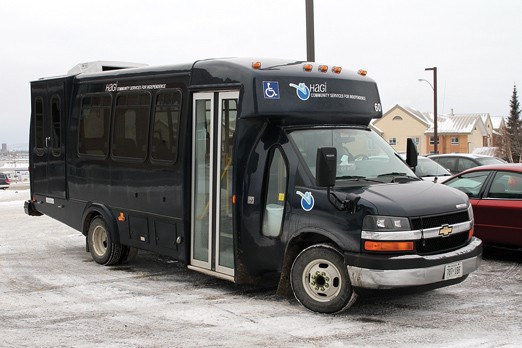The executive director of Handicapped Action Group Inc. is concerned the city’s proposed takeover of accessible transit will lead to fewer people using the system.
Cal Rankin, who intends to speak out against the plan, scheduled to be implemented on Jan. 1, 2014 should council give it the nod of approval on Monday night, said the loss of any point-to-point service would be disastrous.
“We know that the service is in great demand and we cannot meet that demand with the current funding. My concern is as we move forward, and try to integrate this service, will it meet the needs of people who really do need point-to-point service and cannot ride city transit,” Rankin said on Thursday.
Upset at what he termed a lack of transparency from city administration as they move toward integration of services, Rankin said their 8,663 registered clients have to be referred by their doctor before they can use HAGI Transit, which is already funded by the city to the tune of a $1.58-million annual net operating cost.
“I think there’s maybe a perception that there is abuse of the system and there’s a bunch of people that are riding HAGI that shouldn’t be. But we know this simply isn’t the matter. We know there is a need to expand this door-to-door service,” Rankin said.
“We haven’t been able to meet the demand for years and I think we may be taking a larger step backward.”
However, a report prepared for the city by Genivar Inc. suggests the usage rate in Thunder Bay, 0.079 per capita, is 246 per cent more than the 0.032 per capita average in 27 communities and the city plan calls for a review of the eligibility process.
“The current eligibility criteria and certification process is very permissive which could lead to unintentional demand from persons that are able to use the conventional accessible low-floor bus service for some trips, some of the time,” says Transit Services manager Brad Loroff in an overview report being presented to council on Monday night.
Specialized transit has been in operation in Thunder Bay since 1975, and today receives core funding from both the city, with the province kicking in money each year for specialized bus replacement.
The contract with HAGI expires on Dec. 31, 2013, and administration says a study of 27 specialized transit operations across Canada The study, conducted by Genivar Inc., shows more than half are operated fully in-house by their respective municipalities.
Of the rest, all but five, including Thunder Bay, use a hybrid model that sees the city retain core functions including service planning, client registration, scheduling and dispatch operations. Thunder Bay’s base, of 0.079 registrants per capita is significantly higher than the study average of 0.032.
The city’s plan would see all HAGI vehicles paid for through funding programs accessed by the city be turned over to the city at no cost, other than administrative costs, totaling about $15,000.
The municipality has also set aside $150,000 to cover any possible costs associated with the transfer and registration of scheduling software, in case it doesn’t work with the existing transit system. Additional costs, totaling $1.15 million, will be necessary to expand the transit garage and house any additional staffing requirements.
The move would include relocating season equipment and the historical Brill buses outside.
Sheila Kivisto, president of Amalgamated Transit Union 966, said her members are completely behind administration’s plan.
“We’re just pleased to see that it’s being brought all the way through and hopefully council decides the right way to go,” said Kivisto, adding she doesn’t believe current HAGI Transit users will be adversely affected.
“The union believes this service needs to be updated and looking at more efficient ways of doing things. And we believe this is the positive way to go.”
Sign in or register
- Messages
- Post a Listing
- Your Listings
- Your Profile
- Your Subscriptions
- Your Likes
- Your Business
- Support Local News
- Payment History
Registered Users
Already have an account?
New Users
Create a free account.
